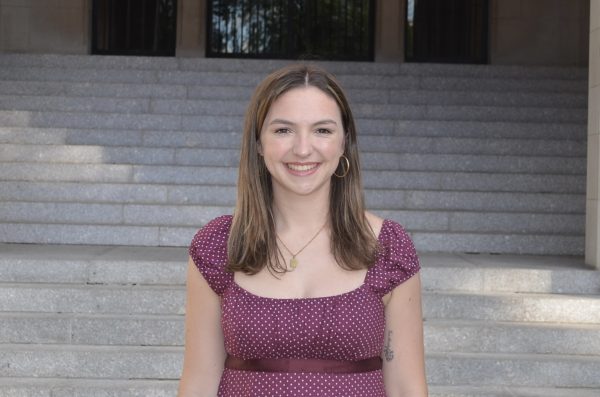Fordham University’s Center on Religion and Culture hosted author Blair Braverman at the McNally Amphitheater on Oct. 9. The event included a presentation by Braverman, a Q&A and a book signing. David Gibson, the director of the Center on Religion and Culture, moderated the discussion.
Gibson began the event by introducing Braverman, who is a musher — a person who drives a dog sled — writer and social media influencer. She is the bestselling author of several novels, including “Welcome to the Goddamn Ice Cube,” “Dogs on the Trail” and “Small Game.”
Additionally, Braverman is a contributing editor for Outside Magazine and a contributing writer for various media outlets, such as The New York Times, Vogue and This American Life. After finding Braverman on social media and also reading her book, Gibson said he was struck by the interconnectedness of her Jewish identity in her life as a musher, specifically in being an outsider in the places where she mushes.
After Gibson introduced her, Braverman gave a presentation about her life as a dog sledder. She explained that she does long-distance dog sledding, traveling between 100 and 1,000 miles at a time and often participates in races. She emphasized that there are few women in long-distance mushing, and even fewer who are Jewish, meaning she is a minority among the community.
Throughout the majority of the presentation, Braverman discussed her relationship with her sled dogs, sharing several stories. She first talked about when she got stuck in a blizzard while mushing, saying that her lead dogs — the two dogs in the front of the team — refused to continue moving. Knowing that there was a shelter a couple of miles up the trail, she decided to switch the dogs’ positions, hoping that another dog would be able to lead the team. She explained that the only dog willing to keep moving was Harry, who is blind.
“He led us all the way to the shelter that day. He was the only dog on the team who didn’t need to see the trail in order to trust his instincts and find it,” Braverman said.
Braverman also said that she always mushes alone, meaning she and her dogs must endure problems and dangers. Braverman cited specific situations she has found herself in: crossing rivers, reaching areas with no snow, temperatures of down to minus 50 degrees Fahrenheit and becoming surrounded by wolves.
She also explained that the biggest challenge with mushing is keeping the team safe. Because she has no reins and no braking system, she has no physical way to stop the dogs.
“Everything the team and I are doing together is because of communication and it’s things that they’re choosing to do,” Braverman said. Braverman introduced her lead dogs, showing photos of them. She said Peppi is brilliant and once traveled 800 miles across Alaska as the only dog pulling the sled, and Jenga, while often playing pranks on the other dogs, is a genius. She talked about a time when Jenga led Braverman’s team and several other teams through a glacier by finding the rough patches of ice.
She also talked about Willow, who enjoys bounding through deep snow, Colbair, who will eat anything, and Refried, who would often “sing” to motivate the rest of the team. Braverman added that after Refried died, her other dogs also began to sing. “I realized that the dogs felt her absence, and even though … no other team has ever sung while running, my team started to do that because they felt Refried’s absence and were starting to fill that silence with their own songs in her honor,” Braverman said. “She changed the culture of the entire team.”
Following the presentation, Gibson led a Q&A, asking Braverman several pre-planned questions and questions that audience members had written on note cards.
Gibson first asked what motivated Braverman to begin mushing, to which she said she was inspired by a book she read as a kid called “The Bravest Dog Ever: The True Story of Balto.” She also explained that she doesn’t like adrenaline and considers herself to be a very nervous person, but that this trait motivates her passion.
“I think, if I’m going to be nervous, I might as well be doing something really exciting with it, something that I feel good about,” she said.
In response to a question about how she communicates with her dogs, she explained how she is able to read her dogs’ body language and notice subtle differences like changes in the way their ears bounce. She also answered a question about whether she identifies as a writer or a musher, saying that she identifies as both and that mushing is what she does, but writing is who she is.
To close out the discussion, Gibson had asked Braverman where she finds wonder. “I mean, dogs are pulling me through the wilderness,” she said. “There isn’t one thing about that that isn’t just like the most miraculous thing I can think of. It feels fake at times because it’s so beautiful. It’s all wonder out there.”
After the event, several attendees stuck around to get their copies of Braverman’s book signed by her.










































































































































































































